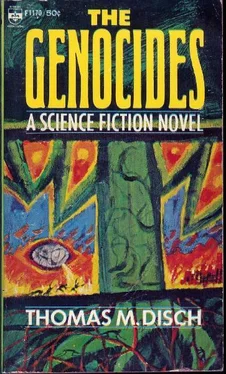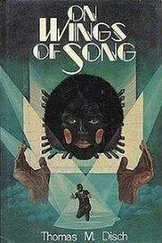In the vestibule they were out of the line of sight from the picnic grounds. The floor was reassuringly solid. Greta took the nape of Buddy’s neck firmly in her two cold hands and pulled his lips to hers. Their teeth gnashed together, and their tongues renewed an old acquaintance.
When he began to pull her closer, she drew back, laughing softly. Having gained what she wanted, she could afford to tease. Yes, that was the old Greta.
“Wasn’t Neil drunk?” she whispered. “Wasn’t he just stinko?”
The expression in her eyes was not exactly as he remembered it, and he could not tell, of the body beneath her winter clothes, whether it had changed likewise. It occurred to him to wonder how much he had changed, but the desire mounting within him overrode such irrelevancies. Now it was he who kissed her. Slowly, in an embrace, they began to sink to the floor.
“Oh no,” she whispered, “don’t.”
They were on their knees thus, when Anderson entered. He did not say anything for a long time, nor did they rise. A strange, sly look came over Greta’s face, and Buddy thought that it had been this, nothing but this, which Greta had hoped for. She had chosen the church for that very reason.
Anderson made a gesture for them to get up, and he allowed Greta to leave, after only spitting in her face.
Was this compassion, that he did not demand the punishment that the law—his own law—exacted of adulterers: that they be stoned? Or was it only parental weakness? Buddy could read nothing in the old man’s grimace.
“I came here to pray,” he said to his son when they were alone. Then, instead of finishing his sentence, he swung his booted foot hard at him, but too slowly—perhaps it was the liquor—for Buddy twisted aside in time and received the kick safely in his hip.
“Okay, boy, we’ll take care of this later,” Anderson promised, his voice slurring the words. Then he went into the church to pray.
It seemed that Buddy was no longer to enjoy the position he had inherited last June of being foremost in his father’s favor. As he left the church, the first snowflakes of the new season drifted down from the gray sky. Buddy watched them melting on the palm of his hand.
Gracie the cow lived right there in the commonroom with everybody else. The chickens, likewise, had a corner to themselves, but the pigs were housed in a sty of their own, outside.
For four days, beginning that Thanksgiving, the snow had drifted down, slowly, ponderously, like snow settling on the miniature town inside a glass paperweight. Then for one week of bright wintry weather the children went sledding down the old lakeshore. After that the snow came down in earnest, driven by gale winds that made Anderson fear for the walls, bolstered though they were by the high drifts. Three or four times a day the men went outside to wind back the “awning” that formed the roof of the commonroom. As the half of the roof heavy with snow was cleared off and rolled up, the other half emerged from its weathertight cocoon to replace it. Aside from this chore and the care of the pigs, the men were idle during a blizzard. The rest of the work—cooking, weaving, looking after the children and the sick—was for women. Later, when the weather cleared, they could hunt again or, with more hope of success, fish through the ice of the lake. There were also plenty of Plants to chop down.
It was hard to get through these idle days. Drink wasn’t allowed in the commonroom (there were enough fights as it was), and poker soon lost its appeal when the money in the pot was no more valuable than the money the children played with at their unending games of Monopoly. There were few books to read, except Anderson’s calf-bound Bible (the same that once had graced the lectern of the Episcopal Church), for indoor space was at a premium. Even if there had been books, it was doubtful that anyone would have read them. Orville might have—he seemed a bookish sort. Buddy would have. And Lady had always read a lot too.
The conversation, such as it was, never rose above the level of griping. For the most part, the men imitated Anderson, who sat immobile on the edge of his bed, chewing the pulp of the Plant. It is questionable, however, whether they spent this time, like Anderson, in thought directed to useful ends. When spring came, all the ideas, the projects, the innovations came from Anderson and no one else.
Now, it appeared, there was someone else capable of thought. He, by contrast, preferred to think aloud. To the old man, sitting there listening to Jeremiah Orville, the ideas that were put forth seemed positively irreligious at times. The way he talked about the Plants, for instance—as though they were only a superior laboratory specimen. As though he admired their conquest. Yet he said many things, in almost the same breath, that made good sense. Even when the weather was the subject of conversation (and more often than not it was), Orville had something to say about that.
“I still maintain,” Clay Kestner had said (this was on the first day of the bad blizzard, but Clay had been maintaining the same thing for several years), “that it’s not the weather getting colder but us getting out in the cold more. It’s psychosomatical. There ain’t no reason for the weather to get colder.”
“Damn it, Clay,” Joel Stromberg replied, shaking his head reprovingly (though it might have been just palsy), “if this winter ain’t colder than the winters in the sixties and fifties I’ll eat my hat. It used to be that we’d worry whether we was going to have a white Christmas. And I say it’s the way the lake has gone down causes it.”
“Poppycock!” Clay insisted, not without justice.
Usually no one would have paid any more attention to Clay and Joel than to the wind whining about the spiky Plants outside, but this time Orville intruded: “You know—there may be a reason why it’s getting colder. Carbon dioxide.”
“What’s that got to do with the price of eggs?” Clay quipped.
“Carbon dioxide is what the Plants—any plants—take in to combine with water when they’re making their own food. It’s also what we—that is, animals—exhale. Since the Plants have come, I suspect that the old balance between the carbon dioxide they take in and the amount we give off has started favoring the Plants. So there’s less carbon dioxide in the atmosphere. Now, carbon dioxide is a great absorber of heat. It stores heat from the sun and keeps the air warm. So with less carbon dioxide, there’ll be a lot more cold and snow. That’s just a theory, of course.”
“That’s a hell of a theory!”
“I’ll agree with you there, Clay, since it’s not mine. It’s one of the reasons geologists give for the ice ages.”
Anderson didn’t believe strongly in geology, since so much of it went against the Bible, but if what Orville said about carbon dioxide was true, then the worsening of the winters (and they were worse, no one really doubted it) might well have that for a cause. But true or not, there was something he didn’t like in Orville’s tone, something more than just the know-it-all attitude of the college grad, which Anderson was used to from Buddy. It was as if these little lectures on the wonders of science (and there had been more than a few) had but a single purpose: to lead them to despair.
But he did know more science than anyone else, and Anderson grudgingly respected him for it. If nothing else, he’d stopped Clay and Joel from arguing about the weather, and for that small blessing Anderson could not help but give thanks.
It was not as bad yet as it would become in February and March, but it was very bad: the close quarters, the silly quarrels, the noise, the stench, the abrasion of flesh on flesh and nerve on nerve. It was very bad. It was well nigh intolerable.
Читать дальше












